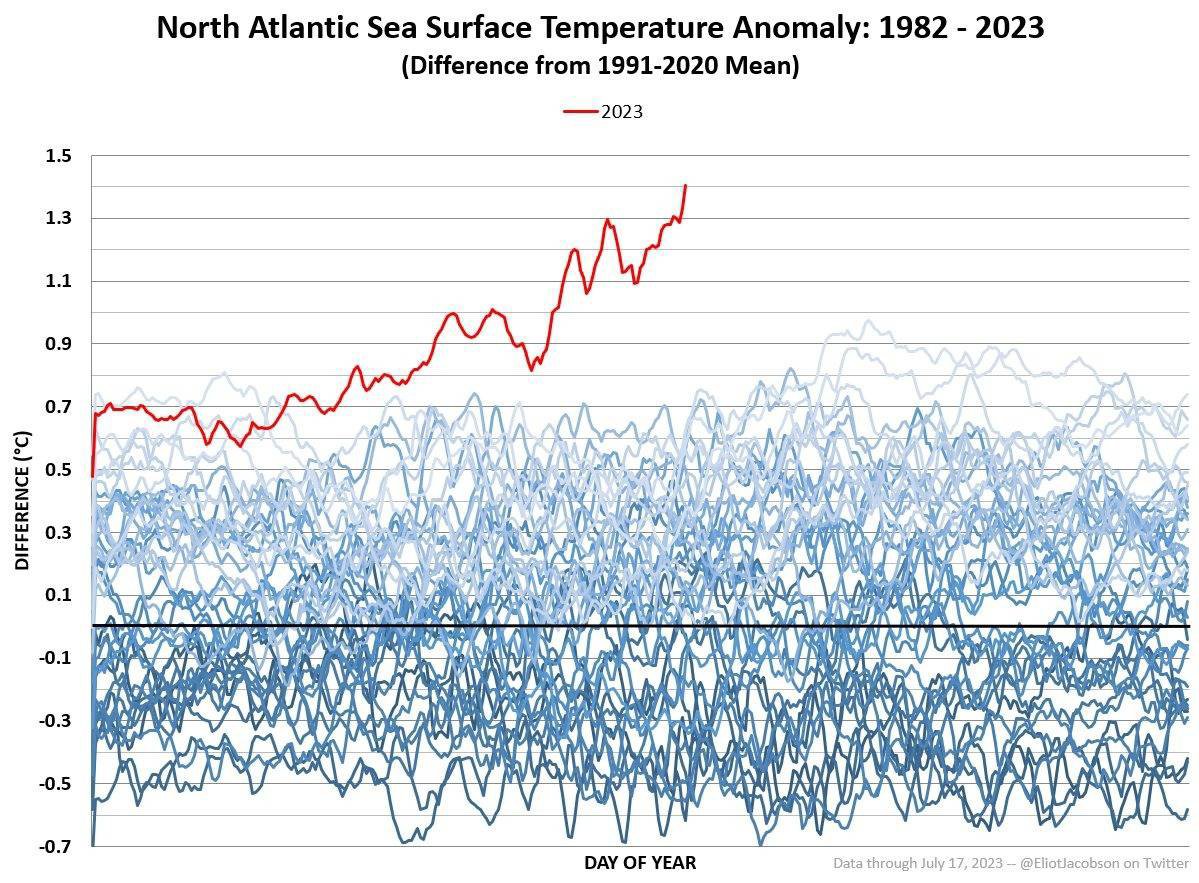this post was submitted on 19 Jul 2023
560 points (98.8% liked)
Collapse
3237 readers
1 users here now
We have moved to https://lemm.ee/c/collapse -- please adjust your subscriptions
This is the place for discussing the potential collapse of modern civilization and the environment.
Collapse, in this context, refers to the significant loss of an established level or complexity towards a much simpler state. It can occur differently within many areas, orderly or chaotically, and be willing or unwilling. It does not necessarily imply human extinction or a singular, global event. Although, the longer the duration, the more it resembles a ‘decline’ instead of collapse.
RULES
1 - Remember the human
2 - Link posts should come from a reputable source
3 - All opinions are allowed but discussion must be in good faith.
4 - No low effort posts.
Related lemmys:
- /c/green
- /c/antreefa
- /c/gardening
- /c/[email protected]
- /c/[email protected]
- c/[email protected]
- /c/biology
- /c/criseciv
- /c/eco
founded 4 years ago
MODERATORS
you are viewing a single comment's thread
view the rest of the comments
view the rest of the comments

It takes about ~30 years to see the effects of emissions on the climate. That means the climate crisis we're experiencing right now is only the emissions up to ~1993. Looking at CO~2~ emissions alone, in 1993 the global total was 22.8 billion tonnes. The latest Data available is from 2021, which shows the global CO~2~ emissions at 37.1 billion tonnes. That's in increase of 14.3 billion tonnes of annual CO~2~ emissions in the amount of time it takes us to feel the effects, that's a 61% increase in Annual emissions, Not Total emissions. If we stopped all CO~2~ emissions today, it would continue to get considerably worse for at least the next quarter-century. We are truly ~~Fucked~~ on the bleeding edge of that climate "tipping point" and major changes are about to start happening very rapidly.
source for CO~2~ emissions numbers: https://ourworldindata.org/co2-emissions
Where did you learn that CO2 emissions take 30 years to have an effect on our atmosphere?? I've never heard that.
30 years isn't a hard number, but it can still take 2-3 decades. It has to do with how CO~2~ changes ocean chemistry, which has broad effects on the rest of the climate. https://info.ecogardens.com/blog/what-is-climate-change-lag-and-why-do-we-care
Edit: I think this is the first place i saw it years ago https://skepticalscience.com/Climate-Change-The-40-Year-Delay-Between-Cause-and-Effect.html
I imagine you noticed this but that second citation (from your edit) has this at the top of the article:
Update August 9, 2020: Please be aware that this article was published in 2010 and that its content is no longer considered accurate. As it still gets regularly linked to from other websites, we will not delete or "unpublish" it. Instead, here is the link to a better take on this topic published by our late team member Andy Skuce in 2013: Global Warming: Not Reversible but Stoppable.
This is a long debunked myth.
Here is an article that goes into some detail.
https://www.carbonbrief.org/explainer-will-global-warming-stop-as-soon-as-net-zero-emissions-are-reached/
So there is some hope, if we can stop emoting CO2 ASAP. If one finds that a realistic path to belive in on the other hand is a matter of opinion.
I think it's a misunderstanding, not a myth.
CO2 influences the greenhouse effect - keeping more solar energy on Earth.
Solar energy gets converted into heat, heat gets absorbed. Some of it gets absorbed by oceans. Some of CO2 also gets absorbed by oceans - their pH decreases. The greenhouse effect doesn't require great time, but oceanic warming and acidification does require time. Interaction happens on the surface, but the volume is great.
Thus, delays in response are inevitable. Response may also depend on circulation - an ocean current slowing or speeding up.
what about carbon capture?
Imagine a bull in a china shop destroying everything, now there is two options :
Carbon capture is the option 2, we continue to break the carbon molecules for energy pretending that we can recapture later. It's not gonna happen, we need to stop emitting NOW and maybe we can think about carbon capture.
Apparently the scale that's required makes it completely impractical, especially given the timelines that are also required.